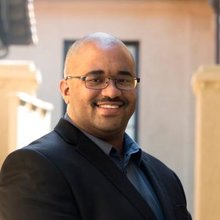-
Center of Autonomy and AI, Center for Cyber-Physical Systems and the Internet of Things, and Ming Hsieh Institute Seminar Series

Wed, Oct 06, 2021 @ 02:00 PM - 03:00 PM
Ming Hsieh Department of Electrical and Computer Engineering
Conferences, Lectures, & Seminars
Speaker: Monroe Kennedy III, Mechanical Engineering, with a courtesy appointment in Computer Science at Stanford University
Talk Title: Considerations for Human-Robot Collaboration
Series: Center for Cyber-Physical Systems and Internet of Things
Abstract: The field of robotics has evolved over the past few decades. We've seen robots progress from the automation of repetitive tasks in manufacturing to the autonomy of mobilizing in unstructured environments to the cooperation of swarm robots that are centralized or decentralized. These abilities have required advances in robotic hardware, modeling, and artificial intelligence. The next frontier is robots collaborating in complex tasks with human teammates, in environments traditionally configured for humans. While solutions to this challenge must utilize all of the advances of robotics, the human element adds a unique aspect that must be addressed. Collaborating with a human teammate means that the robot must have a contextual understanding of the task as well as all participant's roles. We will discuss what constitutes an effective teammate and how we can capture this behavior in a robotic collaborator.
Biography: Monroe Kennedy III is an assistant professor in Mechanical Engineering and courtesy of Computer Science at Stanford University. He leads the Assistive Robotics and Manipulation laboratory (arm.stanford.edu), which develops robotic assistants by focusing on combining modeling and control techniques together with machine learning tools. Together, these techniques will improve robotic performance for tasks that are highly dynamic, require dexterity, have considerable complexity, and require human-robot collaboration. Prof. Kennedy received his Ph.D. in Mechanical Engineering and Applied Mechanics and Masters in Robotics at the University of Pennsylvania and was a member of the GRASP Lab. He was the recipient of GEM and NSF graduate fellowships. During his graduate studies, his research focused on increasing the abilities and effectiveness of robotic mobile manipulators performing complex service tasks in unstructured environments with considerations for working alongside human collaborators.
Host: Pierluigi Nuzzo and Feifei Qian
Webcast: https://usc.zoom.us/webinar/register/WN_p5OEJlPxQlakO4hqovuGEQLocation: Online
WebCast Link: https://usc.zoom.us/webinar/register/WN_p5OEJlPxQlakO4hqovuGEQ
Audiences: Everyone Is Invited
Contact: Talyia White
This event is open to all eligible individuals. USC Viterbi operates all of its activities consistent with the University's Notice of Non-Discrimination. Eligibility is not determined based on race, sex, ethnicity, sexual orientation, or any other prohibited factor.




